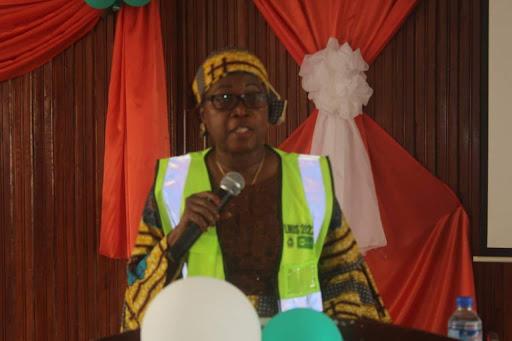Liberia: MOH, Partners Launch Malaria Indicators Survey 2022

Health Minister, Dr. Wilhelmina Jallah
... “Today we are officially launching the Malaria Indicator Survey (MIS) 2022, the fourth time the survey is being conducted in Liberia. As a stand-alone household survey, the MIS will collect data from the selected households around the country,” said the Minister of Health.
The Ministry of Health (MoH) in collaboration with its partners has launched the 2022 Liberia Malaria Indicators Survey (LMIS), targeting 150 Clusters in six Health Regions across the 15 counties.
The survey is intended to generate up-to-date demographic and malaria health indicators at national and regional levels for evidence-based decision making. It will also assess the ownership, access and use of mosquito nets as well as coverage of intermittent preventive treatment against malaria in pregnancy.
At the same time the survey will measure the prevalence of malaria and anemia among children aged 6-59 months, which will also help to identify practices used to treat malaria among children under five years of age, and the use of specific anti-malaria medication in Liberia.
Health Minister, Dr. Wilhelmina Jallah, stressed that the conduct of the MIS will inform the Ministry and its partners on how mosquito nets are used, especially by children under five years of age and pregnant women.
“Today we are officially launching the Malaria Indicator Survey (MIS) 2022, the fourth time the survey is being conducted in Liberia. As a stand-alone household survey, the MIS will collect data from the selected households around the country,” said Jallah.
According to her, over the years a lot of funds have been put into trying to get rid of malaria. “If we add up these figures, it would be a lot, because we will not be able to count those figures including other support. This is a lot,” she adds.
Jallah, having acknowledged the huge donor support to the Malaria Control Program over the years, however, stressed that “let malaria not be our issue anymore. I hope that as the planning is being made after the survey, we have a decision reached. It is our hope that every facility will be equipped with a microscope and a technician.”
According to her, the gold standard cannot be used if microscopes are not available and she expressed hope that they were in the plans.
“We are trying as a government to improve primary healthcare,” she said. She also encouraged those in the field to conduct the survey, adding “please reach every home.”
Dr. Peter Clement, WHO Representative Liberia
Launching the survey, Dr. Peter Clement, WHO Representative Liberia, said the concept behind this indicator survey is one that is an individual level survey conducted on a household level, which will provide information on the general population carried out on those seeking healthcare in the country.
Clement stated that the survey will also provide data on the current malaria interventions including mosquito nets ownership. “We will also access the knowledge, attitude and practices of the general population and provide evidence for decision making.
Stakeholders at the launch of the 2022 Liberia Malaria Indicators Survey
He described this as an important milestone because malaria continues to challenge the health and welfare of Africa, and it remains the main cause of illness and death in communities. We must combat malaria with the relevant tools and approaches guided by evidence to defeat this disease. The outcomes of this exercise will help the country,” he added.
Meanwhile, the exercise is expected to last for 65 days. This being the fourth time the survey is being conducted in Liberia, it is expected to take place in 6 regions to include (Greater Monrovia, Northwestern, and South central, Southeastern A&B and North Central and 150 Clusters across 15 counties in the 6 regions.
However, the Deputy Program Manager and Project Manager of MIS 2022, D. Levi Hinneh, said in a presentation that the first post war MIS in Liberia was conducted in 2005 and Prevalence was reported at 65%. In 2009, the second MIS was also conducted at the same time and the Prevalence was reported at 32% and 37%. In 2011, the third MIS was conducted, and prevalence reported at 28% and 45% respectively.
He added that 12 teams of one supervisor, two interviewers, two biomarkers and a team logistician will visit selected households across the country to enumerate heads of households, women of child bearing age and test children 6-59 months for anemia and malaria.
Commenting on the build up to the survey, Dr. Sara Scates, the Survey Manager at the Demographic and Health Survey Program based in the United States, said the process started with pretesting of the survey tools and methodology in three counties (Bomi, Margibi and Montserrado).
This was followed by the main training of 84 trainees among which 60 were selected for the conduct of the survey. Scates, who led the training along with three of her international counterparts, praised the contribution of some of the field staff including Prince Gonqueh, James Momo, Dakina Jackson and others. She said these people were fantastic and have demonstrated that Liberia has people to rely on for facilitation when conducting the MIS in the future.
In a related development, the Chief Medical Officer and Deputy Minister for Health Services, Dr. Francis Kateh, admonished the field teams to do their best in reaching every selected household as the future of the country depends on the work of the current generation.
Kateh thanked partners and donors for the support and expressed his admiration for the field teams who emerged as finalists after a rigorous training process.
